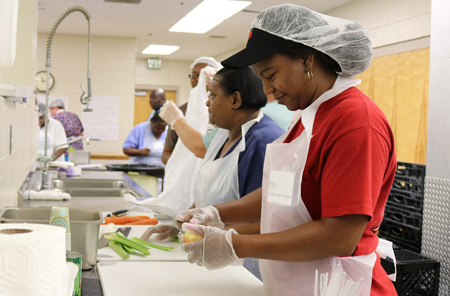Dishing Up Farm-To-School Success

With a few quick slices of her knife, chef Hollie Greene cubes cantaloupe. She sprinkles fresh orange zest and squeezes the juice over the melon. Then her taste-testers descend with forks in hand.
But these aren’t just any taste-testers. They’re school cafeteria managers on a mission — to learn fresh techniques to prepare nutritious, delicious meals for Alabama students.
Alabama State Department of Education’s (ALSDE) June Barrett said the Healthy Cuisine For Kids training echoes the Farm-To-School movement, which allows farmers to sell produce directly to local school systems.
“We feel like if a child knows a food is grown in that community and knows the person who then planted and harvested it, they’re more likely to consume it,” said Barrett, ALSDE’s Child Nutrition Program (CNP) coordinator.
Nearly a third of the state’s 1,500 cafeteria managers filled their recipe boxes and sharpened culinary skills through 18 two-day trainings this summer. A registered dietitian and a professional chef led each training, which focused on basic culinary abilities like measuring and knife skills; fruits and vegetables; whole grain-rich foods; and meats and proteins.
Susan Wood has spent more than four decades as a registered dietitian, with stints as a hospital dietitian and University of Alabama-Birmingham assistant professor before logging 23 years at Hoover City Schools. Today, she works for the Institute of Child Nutrition out of Oxford, Mississippi, which coordinates training for cafeteria managers.
Wood encourages tasting the rainbow — albeit the fruit and veggie sort, not the chewy candy kind.
“Fruit and vegetables have so many different vitamins, fiber and minerals, and that’s where kids are lacking today,” Wood said. “They’d rather grab a bag of chips instead of fruits and vegetables to eat.”
Attractively arranging easy-to-eat food is a key component of the training, Wood said. So is concentrating on in-season produce, like oranges in December and watermelon in August.
Barrett said schools are turning back to basics and emphasizing from-scratch cooking and campus gardens, where students dig in the dirt and taste the fruits of their labor.
“Cooking from scratch allows us to produce foods that are lower in fat, lower in sodium and healthier for a child in that manner,” said Barrett, who noted cafeteria foods comply with the research-based Dietary Guidelines for Americans. “It allows them to increase the palatability of the food…then it is our desire that the child would eat it and have the most nutritive value of the food we possibly can provide.”
Sandy Wilkerson feeds nearly 500 students daily at a Montgomery County school. She said slimming down salt use and spicing up foods with herbs like oregano, garlic powder and paprika are tricks she’ll incorporate this year after attending training in Greenville.
Last year, Wilkerson introduced students to foods outside the realm of potatoes, rice and chicken nuggets. Roasted veggies, like cauliflower, are new staples on her menus.
“We’ve taught them about lots of different things,” Wilkerson said. “Avocado, kumquats — these are things that are readily available in the grocery that they didn’t know much about.”
Stimulating new tastes at school affects change outside the classroom, too.
“The thing I love about this is kids spend 12,000 hours between kindergarten and 12th grade in school,” Greene said. “Where else are they going to learn about food?”
The Alabama Fruit and Vegetable Growers Association’s (AFVGA) Mac Higginbotham said growers and cafeterias can more easily participate in Farm-To-School thanks to a bill Gov. Kay Ivey signed July 27.
“It’s important children learn at an early age where their food comes from and that tasty, wholesome produce is grown in Alabama,” said Higginbotham, the AFVGA’s executive director. “Melons, sweet potatoes, satsumas and tomatoes are just a few products Alabama farmers can provide for schools.”
Interested farmers should contact their local CNP director or visit AlabamaFarmToSchool.org. For information on the state CNP, visit alsde.edu.
